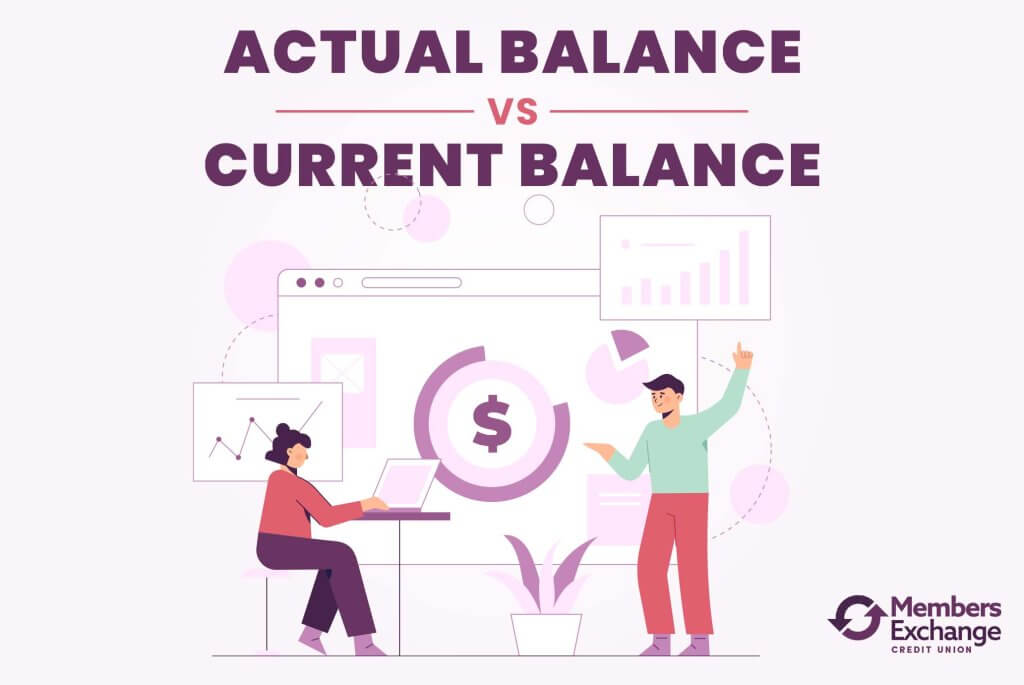What is an Actual Balance vs. an Available Balance?
Your checking account has two kinds of balances: the “actual” balance and the “available” balance. Both can be checked when you review your account online, by mobile application, by phone, or by contacting the credit union. It is important to understand how the two balances work so that you know how much money is in your account at any given time.
Your ACTUAL balance is the amount of money that is actually in your account at any given time. It reflects transactions that have “posted” to your account, but not transactions that have been authorized and are pending. While the term “actual” may sound as though the number you see is an up-to-date display of what is in your account that you can spend, that is not always the case. Any purchases, holds, fees, other charges, or deposits made on your account that have not yet posted will not appear in your actual balance. For example, if you have a $50 actual balance, but you just wrote a check for $40, then your actual balance is $50 but is does not reflect the pending check transaction. So, at that point, you actually have $50 but you have already spent $40 leaving an available balance of $10.
Your AVAILABLE balance is the amount of money in your account that is available to you to use without incurring an overdraft fee. The available balance takes into account things like holds placed on deposits and pending transactions (such as pending debit card purchases) that Members Exchange has authorized but have not yet posted to your account. For example, assume that you have an actual balance of $50 and an available balance of $50. If you were to use your debit card at a restaurant to buy lunch for $20, then that merchant could ask Members Exchange to pre-authorize the payment. In that case, we will put a “hold” on your account for $20. Your actual balance would still be $50 because their transaction has not yet posted, but your available balance would be $30 because you have committed to pay the restaurant $20. When the restaurant submits the bill for payment (which could be up to a few days later), we will post the transaction to your account and your actual balance will be reduced to $30.
Another example:
If your actual and available balances are both $100 and you use your debit card at a restaurant for $35, a hold is placed on your account and your available balance will be reduced to $65. Your actual balance is still $100 because the transaction has not yet posted to your account. If a check that you had previously written for $75 is presented for payment before the restaurant charge is sent to us for processing, you will incur an overdraft fee. This is because your available balance was $65 when the $75 check was paid. In this case, we may pay the $75 check and charge you an overdraft fee. The overdraft fee will also be deducted from your account, further reducing your balance.
Why is the amount reflected sometimes different from the actual purchase amount?
Your available balance is the balance used to determine when your account is overdrawn. It is very important to understand that you may still overdraw your account even though the available balance appears to show there are sufficient funds to cover a transaction that you want to make. This is because your available balance may not reflect all outstanding checks and automatic bill payments that you have authorized, or other outstanding transactions that have not been paid from your account.
Certain types of transactions are more likely to reflect an amount different from the actual purchase total:
- Restaurants and salons – In these cases, the merchant may authorize an amount above the actual purchase amount to reflect an anticipated tip
- Hotel reservations and car rentals – These are referred to as “travel holds” when you reserve a car rental or hotel room with your Debit Card. In these cases, an additional amount may be held (based on your anticipated length of stay/rental, anticipated incidental purchases, and applicable taxes) to confirm funds will be available to make the final transaction
- Gas stations – When you pre-purchase gas by paying at the pump (even when you use your PIN), a pre-authorized amount may be secured to confirm you have enough money in your account to complete the purchase. Gas stations pre-authorize transactions for amounts typically ranging from $50 to $125 since they do not know how much gas you will actually pump. This type of hold is generally released within minutes of completing your purchase.
Become a Member | Members Exchange Credit Union | Serving Jackson, MS
The best way to know how much money you have and avoid paying overdraft fees is to record and track all of your transactions closely. At Members Exchange Credit Union, our overdraft protection plans are designed to support you when life gets complicated. If you ever have questions regarding specific transactions or account information, please contact us.










